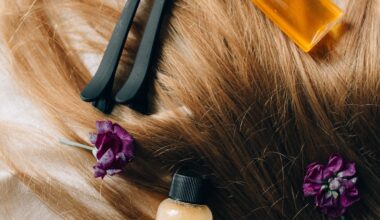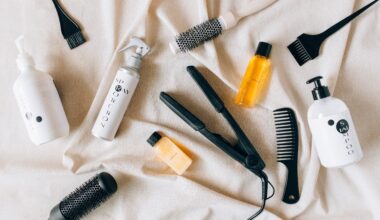Introduction
Imagine a garden where the soil is nourished, rich, and teeming with life. In this garden, the roots of every plant thrive, and the blooms above flourish in radiant beauty. In the world of hair care, your scalp is that garden, and hair oils are the nutrients that nurture it. Welcome to a comprehensive guide on how hair oils can transform your scalp health and elevate the vitality of your hair.
The Foundation: A Healthy Scalp
The Scalp’s Crucial Role: Your scalp is the fertile ground from which your hair emerges. A healthy scalp provides the essential nutrients and support for strong, vibrant hair. Understanding the pivotal role of your scalp is the first step in your journey to beautiful locks.
Common Scalp Issues: Before we delve into the benefits of hair oils, it’s essential to recognize common scalp issues that can impact hair health. These may include dryness, dandruff, itchiness, and excessive oiliness. Addressing these concerns lays the groundwork for optimal hair growth and vitality.
The Role of Hair Oils
Nourishing the Scalp: Hair oils act as potent elixirs for your scalp. They are packed with essential nutrients such as vitamins, fatty acids, and antioxidants that nourish the scalp’s skin and hair follicles. This nourishment is key to maintaining a healthy environment for hair growth.
Balancing Oil Production: Contrary to common belief, using the right hair oils can help balance oil production on the scalp. Oils like jojoba mimic the skin’s natural sebum, sending signals to the scalp to produce less oil, effectively combatting excess greasiness.
Strengthening Hair Follicles: Hair oils have the remarkable ability to strengthen hair follicles, reducing breakage and hair loss. This is particularly important for those aiming to achieve longer, thicker hair.
Enhancing Blood Circulation: Regular scalp massages with hair oils promote better blood circulation. Improved blood flow nourishes the hair follicles and encourages healthy hair growth.
Types of Hair Oils
Coconut Oil: Renowned for its versatility, coconut oil is a favorite among many. It moisturizes, promotes hair growth, and can even protect against damage from UV rays.
Argan Oil: Often called “liquid gold,” argan oil is rich in vitamins and antioxidants. It nourishes and hydrates the scalp and hair, leaving it soft and manageable.
Jojoba Oil: Jojoba oil closely resembles the skin’s natural sebum, making it an excellent choice for balancing oil production. It also moisturizes and soothes the scalp.
Castor Oil: Castor oil is a powerful option for hair growth. It strengthens hair, prevents breakage, and can even contribute to thicker eyebrows and eyelashes.
Olive Oil: Olive oil is not just for cooking; it’s a fantastic hair conditioner. It adds moisture, shine, and softness to your locks.
Almond Oil: Rich in vitamins A, B, and E, almond oil helps prevent hair loss, reduces dandruff, and adds a natural shine.
Essential Oils: Essential oils like lavender, rosemary, and tea tree oil can be added to carrier oils for extra benefits. They offer antimicrobial properties, promote relaxation, and contribute to a healthy scalp.
Application Techniques
Preparation:
- Begin with clean, dry hair. Hair shafts that are free of dirt and product build-up allow for better oil absorption.
Amount of Oil:
- The amount of oil needed varies based on hair length and thickness. Start with a small amount and increase if necessary.
Warm the Oil:
- To improve the oil’s absorption, warm it slightly before applying. You can do this by placing the oil container in a bowl of warm water.
Even Distribution:
- Section your hair for even application. Apply the oil directly to your scalp and gently massage it in with your fingertips. Ensure that the oil is evenly distributed.
Scalp Massage:
- Take a few minutes to massage your scalp. Use gentle circular motions to boost blood circulation and aid in absorption.
Leave-In Time:
- Allow the oil to sit for at least 30 minutes to an hour, or even overnight for deep conditioning. Cover your hair with a shower cap or towel to prevent staining.
Rinse and Wash:
- After the desired leave-in time, rinse the oil out thoroughly with lukewarm water and follow with a mild shampoo and conditioner.
Frequency:
- The frequency of oil application varies by hair type and needs. Some benefit from weekly treatments, while others may prefer monthly sessions.
Maintenance and Care
Post-Oil Wash:
- After rinsing out the oil, use a mild shampoo and conditioner to remove any residual oil. Ensure that all the oil is washed out to prevent greasiness.
Avoid Overuse:
- While hair oils are beneficial, overuse can lead to excessive greasiness. Adjust the frequency of oil treatments based on your hair’s needs.
Protective Styling:
- Consider protective styles like braids or twists to minimize hair manipulation after oil treatments. This helps retain the oil’s benefits.
Gentle Drying:
- When drying your hair after an oil treatment, pat it gently with a towel rather than rubbing vigorously to prevent damage.
Regular Hair Care:
- Continue with your regular hair care routine, including shampooing, conditioning, and styling. Hair oils can complement but not replace these essential steps.
Consult a Professional:
- If you encounter persistent scalp or hair issues, consult a professional stylist or dermatologist for personalized advice and solutions.
Conclusion
In the world of hair care, the journey to healthy, radiant locks begins at the roots – your scalp. It’s a realm where nature’s gifts, in the form of hair oils, play a pivotal role. As we conclude this comprehensive guide, remember that:
- A Healthy Scalp is the Key: A healthy scalp forms the foundation for beautiful hair. It provides the nourishment and environment essential for hair growth.
- Hair Oils Are Your Allies: Hair oils are potent allies in scalp care. They nourish, balance, and strengthen, contributing to a vibrant and resilient scalp.
- Diverse Options Abound: A wide array of hair oils caters to various needs and preferences. Experimenting with different oils can lead to remarkable results.
- Application Matters: Proper application techniques maximize the benefits of hair oils. Massage, warmth, and even distribution are key.
- Maintain and Care: Post-application care is crucial. Proper washing and regular maintenance ensure that your scalp and hair continue to thrive.
As you embark on your journey to nourish your roots and transform your hair, may you experience the beauty of a healthy scalp and the luster of vibrant locks. Your hair care routine is not just a regimen; it’s a ritual of self-care and self-expression.





